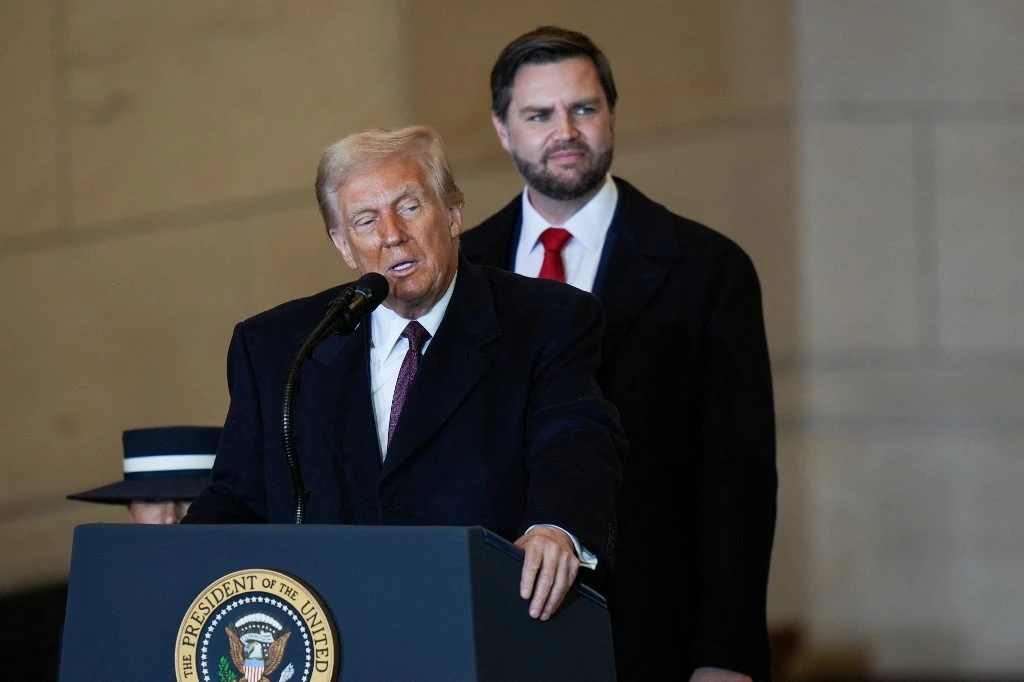
On Monday, Donald Trump and J.D. Vance were sworn in as the 47th President and 50th Vice President of the United States during the inauguration ceremony in Washington. In this article, we’ve gathered the most significant Eurasian reactions.
On Monday, Donald Trump and J.D. Vance were sworn in as the 47th President and 50th Vice President of the United States during the inauguration ceremony in Washington. In this article, we’ve gathered the most significant Eurasian reactions.
On Monday, Donald Trump and J.D. Vance were sworn in as the 47th President and 50th Vice President of the United States, respectively. The inauguration ceremony, held in the Capitol’s rotunda, marked a departure from tradition due to extremely cold weather. The last indoor inauguration occurred in 1985 when Ronald Reagan’s ceremony was also moved indoors because of similar conditions.
“From this moment on, the decline of America is over,” Trump declared in his inaugural address. In a speech lasting over 30 minutes, he made bold promises, including reclaiming the Gulf of Mexico and the Panama Canal, reforming the asylum system, and restoring America’s global influence. “America will be respected and admired again,” he asserted.
Trump’s return to the presidency signals a dramatic shift in Washington’s approach to major global issues, including the war in Ukraine, Middle Eastern tensions, and U.S.-China relations.

Russian President Vladimir Putin wasted no time in congratulating Trump. During a Security Council meeting, Putin expressed Russia’s willingness to resolve the conflict in Ukraine under Trump’s administration. He highlighted Trump’s campaign promises to restore U.S.-Russian relations, stating, “Russia has always been open to dialogue and ready for smooth relations with any U.S. administration.”
Chinese Vice
President Han Zheng, who represented Beijing at the ceremony, held
talks with Vice President J.D. Vance a day before the inauguration.
Zheng expressed China’s readiness to work with the U.S. for healthy
bilateral relations. Trump invited Xi Jinping to the inauguration,
however, true to tradition, the Chinese president declined it.
Indian Prime
Minister Narendra Modi offered his congratulations and expressed
optimism about Trump’s return to office. Modi emphasized the strong
rapport the two leaders shared during Trump’s first term,
particularly on counterterrorism and global security. Modi hopes for
closer U.S.-India cooperation in shaping a better future for
humanity.
Israeli Prime Minister Benjamin Netanyahu also
extended his congratulations, expressing hope for an even stronger
U.S.-Israel alliance. During Trump’s first term, Washington moved
its embassy to Jerusalem and recognized Israeli sovereignty over the
Golan Heights. Moreover, Trump’s special envoy to the Middle East,
Steve Witkoff reportedly had a key role in the recent ceasefire
agreement between Israel and Hamas.
Turkish President
Recep Tayyip Erdoğan praised Trump’s commitment to peace and
expressed hope for a swift resolution to the war in Ukraine. “I
wish Mr. Trump's second term would bring good for all humanity,”
Erdoğan stated.
Japanese Prime
Minister Ishiba Shigeru congratulated Trump, emphasizing their shared
vision for a free and open Indo-Pacific. Notably, Japan was
represented at the inauguration by its foreign minister, Iwaya
Takeshi—the first Japanese FM to attend a U.S. presidential
inauguration.